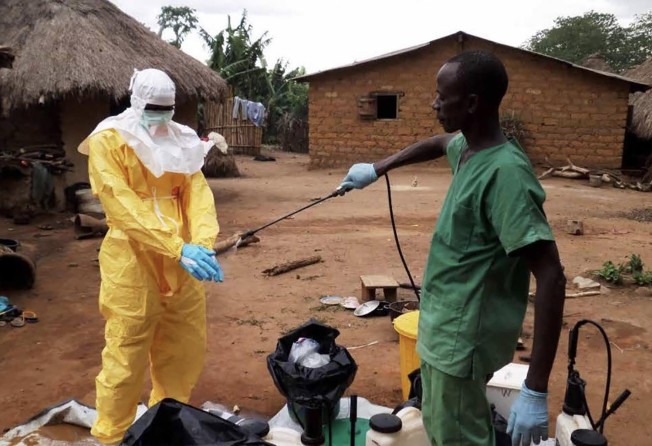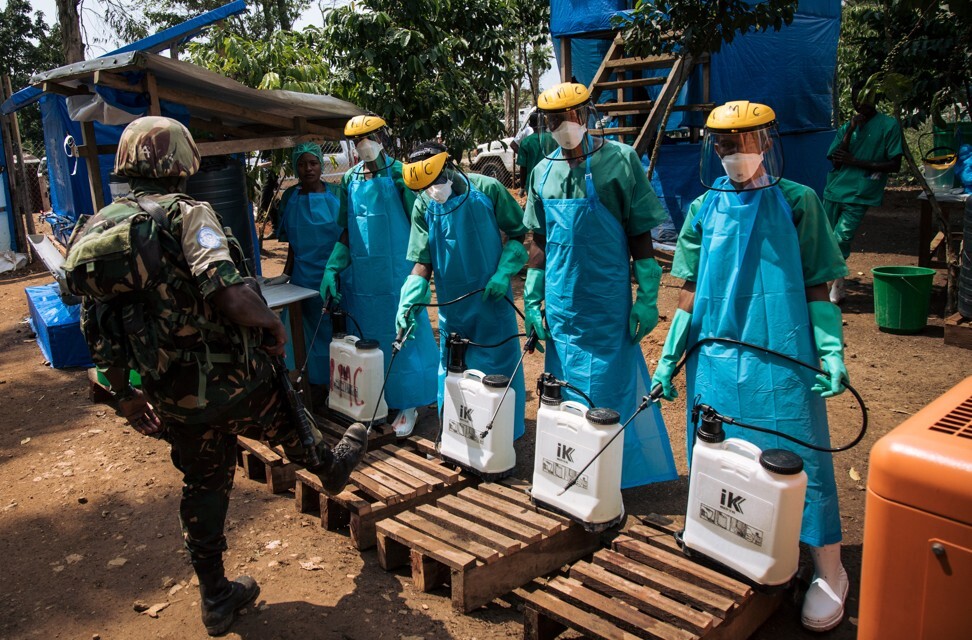West African nations hope experience fighting Ebola will help curb spread of coronavirus
- Although Covid-19 has a lower mortality rate than Ebola, it still threatens to overwhelm vulnerable health care systems
- Experts who helped tackle the previous outbreak say good preparations will be key

Sierra Leone is the only country in West Africa that has yet to report a case of Covid-19. but it hopes that its bitter experiences with Ebola will help it fight the disease if it arrives.
To curb the spread of the disease caused by the new coronavirus, President Julius Maada Bio has closed the country’s borders, “except for the transportation of essential commodities into Sierra Leone under strict supervision”. He also imposed restrictions on overseas travel for government officials and banned public gatherings.
When Sierra Leone found itself in the grip of Ebola in 2014, several countries sent in medical professionals and caregivers to help combat the spread of the disease, whose fatality rate averaged about 28 per cent. In total 3,956 Ebola deaths were recorded in the country.
Dr Madina Hussein from Kenya was among hundreds of health experts from East Africa who were deployed to West Africa to help fight the Ebola epidemic.
When she arrived in Freetown, Sierra Leone’s capital, in 2015 the situation was dire. Besides the horrific scenes such as dead bodies on the streets, she witnessed a country unprepared to fight the deadly disease.
Madina said poor practices, such as limited handwashing and use of gloves, had hampered efforts to contain the disease, and doctors lacked basic supplies.
“We lacked enough gloves for basic protection. Sometimes we were allocated two pairs of gloves per week, which was inadequate for the work we were doing,” she said.
There were also shortages of items such as caesarean section kits or suction catheters, resulting in inappropriate reuse or inadequate sterilisation, putting both patients and staff at risk, Madina added, a situation that she does not want to be repeated.
After the disease was brought under control, Madina remained in Sierra Leone to strengthen the healthcare system, seconded to the ministry of health in the country by the World Bank.
Now she finds herself facing Africa’s coronavirus pandemic, fighting to prevent the spread of the disease into a country struggling with a weak health system.
Madina said countries needed to heighten surveillance to stop importation of cases into the continent, paying close attention to high-risk areas such as airports and border crossings, and expand their capacity to respond.
She said governments should prepare to set up emergency operation centres and ensure there was diagnostic capacity at three or more public health laboratory facilities.
“We have locked all the borders and no flights [are allowed] in or out unless it’s an emergency,” Madina said.
Further, the country is now training people on refresher courses on infection prevention and control and is trying to raise awareness of the disease.
“No cases have been reported as of today. We have also reactivated our emergency centres,” she said in, adding that so far the response had been positive from the government in taking big steps to curb the situation beforehand.
The Democratic Republic of Congo, is also vulnerable to the new disease.
In the DRC, Ebola has killed 2,264, mostly in the northeastern region of Kivu, and infected more than 3,400. It has reported 81 cases of Covid-19, including eight deaths.
Although Covid-19 has lower fatality rates than Ebola, which killed more than half of those infected in the DRC, widespread infections would put devastating pressure on the health system.
On Sunday, World Health Organisation director general Tedros Adhanom Ghebreyesus said it had been more than 40 days since the last Ebola case was confirmed in the DRC and 25 days since the last person in treatment recovered and went home.
“If there are no new cases, the outbreak could be declared over by mid-April. We remain in active response mode in case of flare-ups,” he tweeted.
The Lancet recently said that what had helped the DRC contain the disease was that the “national government took charge in coordinating the response supported by the WHO and donors”. This “allowed African experts, rather than international experts, to remain at the front and centre of the response”.
Additionally, there was the “multidisciplinary approach to the outbreak”, which included “employing more social scientists, applying new technologies, such as whole-genome sequencing, and building community trust and engagement”.
Experts said the readiness efforts put in place and the lessons learned from prior Ebola outbreaks in the DRC and the 2014-2016 crisis in West African countries of Guinea, Sierra Leone and Liberia, could help prepare the countries in detecting and fighting coronavirus.
“It is sad to hear that just as the DRC appears to be near ending its worst Ebola outbreak, a new virus is threatening the health of its citizens,” Matshidiso Moeti, WHO regional director for Africa, said.
“Some of the readiness efforts put in place during the Ebola outbreak may help the country respond to Covid-19.”
Aaron Aruna, director of the fight against diseases in the Ministry of Public Health, said that “having the Ebola screening in place made it easy for us to start screening for coronavirus disease”.
“What we needed to do is not only check people leaving the country, or people travelling from North Kivu to other provinces but also people coming in.”

Gervais Folefack Tengomo, the WHO incident manager for Covid-19 in the DRC, said it was “helpful that a lot of the infrastructure needed to diagnose, isolate and treat severe cases is already in place due to Ebola”.
Gyude Moore, a visiting fellow at the Washington-based Centre for Global Development, and Tolbert Nyenswah, a senior research associate in the department of international health at the Johns Hopkins Bloomberg School of Public Health in the United States, recently published a blog describing their experiences from the Ebola outbreak in Liberia.
When Ebola hit the West African nation in 2014, Moore was a senior adviser to then-president Ellen Johnson Sirleaf, while Nyenswah was the Ebola incident manager for the Liberian government. In Liberia, 10,666 people were infected and 4,806 died.
They said the country had not been prepared for the outbreak and a lack of preventive measures had “resulted in a sharp increase in the number of infections”.
“A lack of protective equipment and proper training also aggravated the spread, and before long our healthcare system began to break down,” the authors said. “Treatment centres were filled beyond capacity, and bodies were left in the streets. That the government seemed unprepared for an outbreak this scale left the public feeling even more confused and fearful.”
Moore and Nyenswah said that although medical treatment and traditional public health measures played an important role, “the precipitous drop in infections came through behavioural change by the general public and only happened once community engagement and trust were made a central part of the response”.
“We learned the value of separating epidemic treatment from the usual health system. Each population centre should designate specific sites where suspected cases will be isolated to ensure that the other parts of the health system continue to function,” the two said.
“Early, frequent and transparent community engagement is the key to responding to any major outbreak.”